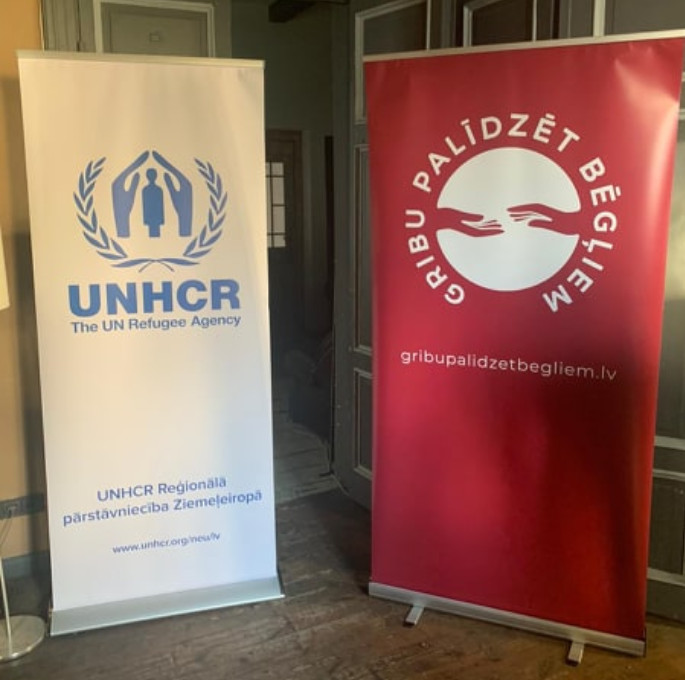The border is threatened by pro-migrant activists, not the lacking fence

On a parliamentary trip to the unfortified eastern part of Latvia's border, MPs saw a familiar sight - a lacking barbed-wire fence in places, at other places there's not even that much. Just promises. But more than the holes in the fence, what threatens the Latvian state is the open-door ideology that is being imposed by both Brussels and local radicals. Hundreds are now coming illegally. The pro-migrant welcomers can get thousands to come legally.
The Baltic States and Poland are now systematically accused of violating human rights, as if the migrants had been issued a Brussels indulgence to break the Criminal Law. Neatkarīgā has already explained that, in the context of the state of emergency, migrants who have entered the country illegally are not arrested, tried and punished, as the Criminal Law provides for such a serious crime, but are instead escorted back to Belarus. They came from there on behalf of human traffickers and the Belarusian authorities. A relatively small proportion of migrants are admitted on "humanitarian grounds", while the proportion of criminals who are not intercepted continue their journey towards Western Europe.
Welcoming them should never be normalized
Pushing migrants back has been practiced in the Baltic States and Poland since the summer and is a relatively effective method. It has also allowed national special services to filter out potentially dangerous Islamic radicals. In Latvia, more than 4,800 people have been stopped from crossing the Latvian border illegally since August 10 last year, when a state of emergency was declared at the border.
But Brussels, instead of expressing its gratitude for their work in guarding Europe's borders, systematically criticizes the Baltics and Poland. The President of the European Commission, Ursula von der Leyen, announced back in the autumn that she would not pay for the fences, as if European taxpayers' money belonged to her, and the European Commissioner for Home Affairs, Ylva Johansson, has just spoken in the European Parliament and said that the Member States need laws that do not accept or legalize the pushbacks of migrants. She has previously stated that "pushbacks should never be normalized". And various international institutions are also trying to force the Baltic States and Poland to open their doors to economic vagrants. This includes the UN Refugee Agency.
Unfair accusations against border guards
Local welcomers are also helping to cultivate the public perception that illegal migrants have some kind of special right to enter Latvia illegally.
Egils Grasmanis, head of the public organization Gribu palīdzēt bēgļiem (I Want to Help Refugees), has, via LETA, made serious public accusations against border guards and soldiers working on the border. According to the evidence available to the association, the force structures on the Latvian side may not only have used disproportionate force, but may have committed crimes against these people. "It is unacceptable that the declaration of a state of emergency has led to the situation where human rights are not respected on the Latvian-Belarusian border and the territory has become a zone of total impunity (..). According to the evidence available to the association, the force structures on the Latvian side may not only have used disproportionate force, but may have committed crimes against these people." Basically, the protection of Latvia from uncontrolled migration flows, which bring with them the threat of radical Islam and terrorism, has been declared a crime. Neatkarīgā asked whether there was indeed a suspicion of overreach at the border. The office of the Minister of the Interior, Marija Golubeva, replied in the negative.
This is good, because criminals should also be treated humanely, which Latvia is doing conscientiously. Most are humanely sent back, a small minority are humanely taken in.
The plan - to let them in and serve them
On Monday, when Members of the Saeima went to the border, 60 people were prevented from entering Latvia. Meanwhile, at the Lithuanian border, for the second day in a row, no illegal border crossings were recorded - diplomatic negotiations with Iraq, the main country of origin of migrants, are going well. They are taking back their own citizens who have strayed into illegal paths. Meanwhile, the situation at Latvia's border continues to stagnate or even deteriorate. Migrants are arriving in larger numbers than last autumn, and the head of the State Border Guard, Guntis Pujāts, has already announced that he will call on the government to extend the state of emergency at the border and in border municipalities for another three months. So, until May.
After the first day of the visit to Latgale, the Defense Committee leaders optimistically reported that they had gained confidence in the high readiness of the Latvian services for various challenges. "We have plans in case the situation deteriorates and Belarus suddenly starts moving larger masses of people close to our border," said Juris Rancāns, head of the Committee.
One of the elements of these plans is the creation of a new migrant accommodation center on the site of a former orphanage in Liepnas parish. If the European and domestic welcomers achieve a ban on the practice of migrant pushback, all those hundreds and thousands of illegals will have to be let into the country and served. As has been done for a long time in the two migrant care centers in the village of Mucenieki, right here in the Baltic Sea region. Accommodation, care, entertainment and even pocket money.